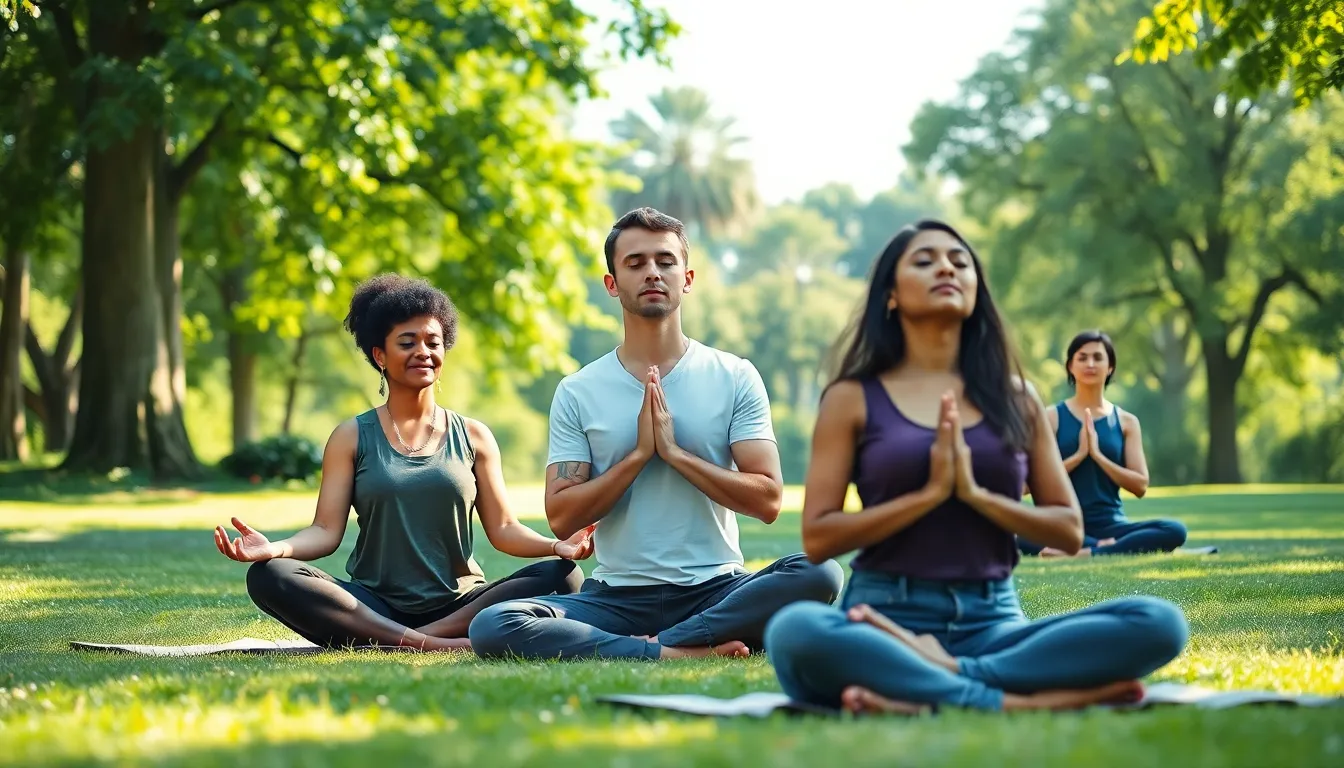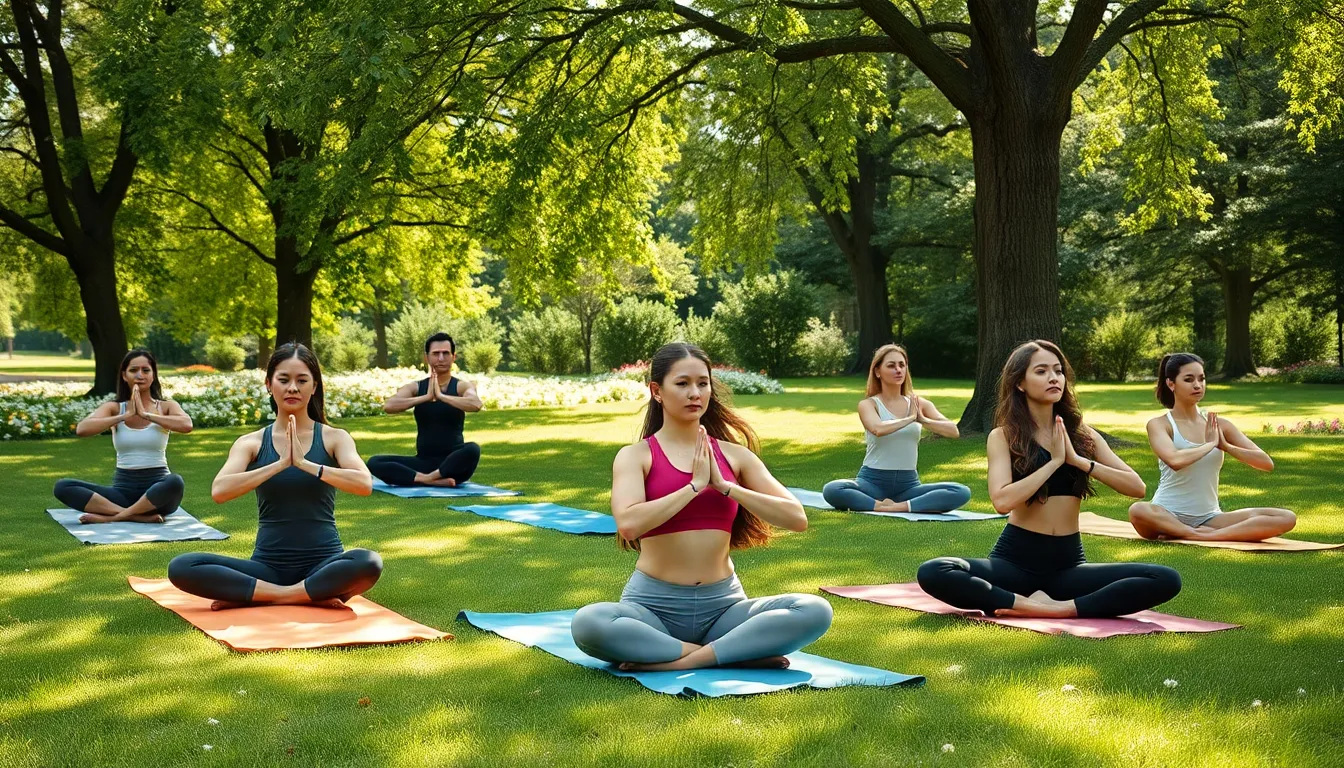In a world buzzing with chaos and endless to-do lists, it’s easy to forget about the most important person in your life—you. Mindfulness self-care isn’t just a trendy buzzword; it’s a powerful tool that can transform the way one navigates daily stressors. Imagine taking a mental vacation without packing a suitcase or dealing with airport security.
By embracing mindfulness, individuals can cultivate a deeper connection with themselves, turning mundane moments into opportunities for joy and reflection. Whether it’s sipping coffee while savoring each sip or simply breathing deeply amidst the hustle, these small practices can lead to monumental changes. Ready to ditch the overwhelm and find your zen? Let’s explore how mindfulness self-care can sprinkle a little magic into everyday life.
mindfulness self care
Mindfulness self-care focuses on nurturing one’s mental and emotional well-being through mindful practices. It transforms everyday moments into opportunities for peace and reflection.
Definition of Mindfulness
Mindfulness is the practice of maintaining a moment-by-moment awareness of thoughts, feelings, and surroundings. This practice encourages individuals to observe their experiences without judgment. Engaging in mindfulness means fully experiencing each sensation, such as the warmth of sunlight or the flavor of food. Techniques often include meditation, breathing exercises, and gentle movement. These techniques serve to anchor individuals in the present, helping to reduce anxiety and enhance overall awareness.
Importance of Self Care
Focusing on self-care plays a vital role in maintaining overall health. It creates time and space for individuals to recharge and reconnect with themselves. Prioritizing self-care helps prevent burnout, promoting emotional resilience. Simple actions, like enjoying a walk in nature or practicing yoga, can significantly improve one’s mood and outlook. Emphasizing self-care prevents the accumulation of stress, allowing for clearer thinking and better decision-making. Implementing regular self-care routines fosters a positive mindset and contributes to long-term well-being.
Benefits of Mindfulness Self Care


Mindfulness self-care offers multiple advantages that enhance overall well-being. Practicing mindfulness directly impacts mental health, fostering resilience and clarity.
Mental Health Improvements
Individuals who engage in mindfulness self-care often experience significant mental health improvements. Regular mindfulness practices lower levels of anxiety and depression. These techniques promote emotional regulation; they encourage individuals to observe thoughts without judgment. Studies indicate that mindfulness practices increase positive emotions while reducing negative ones. Mindfulness meditation, for example, enhances self-awareness. By engaging in self-reflection, a person can identify stressors and triggers effectively. Participants report improved mood and a heightened sense of well-being. Adopting these practices leads to more effective coping strategies, enabling individuals to handle life’s challenges better.
Enhanced Physical Wellbeing
Mindfulness self-care contributes to enhanced physical wellbeing as well. Engaging in mindful activities can lower blood pressure, improve sleep quality, and increase energy levels. Practices like yoga and tai chi combine movement with mindfulness, enhancing bodily awareness and flexibility. Participants in these activities often report reduced bodily tension and a greater sense of relaxation. Furthermore, mindfulness encourages healthier eating habits by promoting conscious food choices. Individuals tend to savor meals more, which aids digestion and nutrition. Scientific research supports the link between mindfulness and physical health; regular practitioners show improvements in various health markers. By prioritizing mindfulness in daily routines, individuals can enjoy a holistic sense of wellness.
Techniques for Practicing Mindfulness Self Care
Practicing mindfulness self-care involves various techniques that enrich mental and emotional well-being. Two fundamental techniques include meditation practices and breathing exercises.
Meditation Practices
Meditation offers a structured way to cultivate mindfulness. Engaging in guided meditation can help individuals focus thoughts and enhance self-awareness. Starting with just a few minutes each day encourages consistency and growth. Techniques like body scan or loving-kindness meditation promote relaxation and compassion. Participants often find their ability to concentrate improves as their meditation practice deepens. Apps such as Headspace or Calm provide excellent resources for beginners. Regular meditation contributes significantly to reducing anxiety and fosters a calm mindset amidst daily stress.
Breathing Exercises
Breathing exercises are simple yet powerful tools for mindfulness. Individuals can practice deep breathing techniques anywhere and anytime. Focusing on slow, deliberate breaths helps center thoughts and quiets the mind. Techniques like the 4-7-8 method promote relaxation by regulating breath patterns. Inhale for four counts, hold for seven, and exhale for eight. Regular practice enhances emotional resilience and reduces stress levels. Incorporating these exercises into daily routines ensures continuous mindfulness and improved overall well-being.
Integrating Mindfulness Self Care into Daily Life
Mindfulness self-care seamlessly fits into everyday routines, enhancing emotional and mental well-being. By prioritizing simple practices, individuals can cultivate mindfulness effortlessly.
Creating a Routine
Establishing a daily routine for mindfulness self-care significantly boosts consistency. Incorporating practices like morning meditation or evening yoga fosters a sense of calm. Each time an individual engages in these activities, they strengthen their connection to the present. Mindfulness breaks throughout the day, such as a few moments of deep breathing or savoring a meal, easily enhance awareness. Scheduling even five minutes for mindfulness can yield noticeable benefits. Gradually, these short sessions create a powerful habit, making mindfulness an integral part of daily living.
Setting Intentions
Setting intentions at the start of each day helps clarify mindfulness goals. Individuals can focus on specific themes, such as gratitude or compassion, guiding their mindfulness practice. Writing intentions down reinforces commitment and accountability. Each time a person reads their intentions, they reconnect with their purpose. Intentions can be adjusted based on daily experiences, allowing for flexibility and growth. Practicing this exercise encourages a deeper understanding of personal needs and desires, making mindfulness self-care more effective.
Conclusion
Embracing mindfulness self-care can profoundly transform one’s daily life. By incorporating simple practices into routines, individuals can cultivate a deeper connection with themselves and navigate life’s challenges with greater ease. These techniques not only enhance mental clarity but also promote emotional resilience and overall well-being.
As people prioritize mindfulness, they create space for joy and reflection in everyday moments. The journey towards a more mindful existence is ongoing and personal, allowing for growth and adaptation along the way. By committing to this practice, individuals can unlock a path to tranquility and fulfillment, ultimately enriching their lives in meaningful ways.

